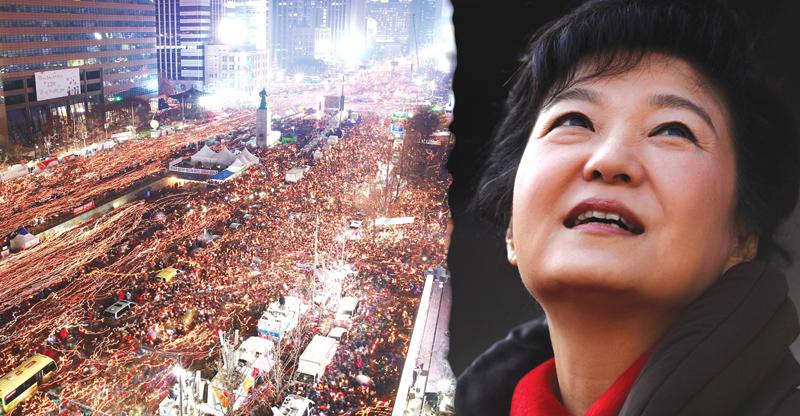
SEOUL - The impeachment of South Korea’s president brings the prospect of a new government for one of the U.S.’s closest allies that could have a skeptical stance toward Washington, a softer line on Pyongyang and a friendlier approach to China.
The resounding decision by the National Assembly to impeach President Park Geun-hye, by a 234-56 vote, is a fresh earthquake to hit the global political order after populist victories in British and Italian referendums, and Donald Trump’s election as U.S. president.
Ms. Park’s immediate removal from power over a corruption scandal marks a turning point after the country’s biggest political crisis in years brought millions onto the streets in protest against her.
Ms. Park has been accused by prosecutors of leaking confidential presidential documents and helping a close friend shake down companies for money. She has denied wrongdoing in three televised statements.
In a cabinet meeting after the vote, Ms. Park said, “I am truly sorry to my fellow Koreans that my carelessness and shortcomings have led to such grave national turmoil.”
If the Constitutional Court upholds the impeachment motion as expected in coming weeks, a presidential election would take place two months later, with most polls showing leftist challengers as the top contenders.
The left-of-center opposition parties have been more skeptical of South Korea’s alliance with the U.S., and could jeopardize policies Washington promotes, such as the enforcement of tough sanctions on Pyongyang or the deployment of a new missile defense system known as Thaad.
Strong resistance to Thaad from China, which opposes U.S. military hardware so close to its border, has also increased unease among opposition leaders about the deployment.
“President Park implemented or has begun to implement a number of policies that the U.S. really likes,” said Bruce Klingner, a former Central Intelligence Agency deputy division chief for Korea, now at the Heritage Foundation, a conservative Washington think tank. “It’s more likely a progressive would win now...who would likely suspend the Thaad deployment and could undo everything else.”
The Obama administration has told Mr. Trump’s transition team that it sees North Korea as the top priority for the incoming administration, given the pace of Pyongyang’s nuclear-weapons development, according to people familiar with the conversations.
It isn’t clear how Mr. Trump will approach North Korea. During the campaign, he suggested that the U.S. should pull back its forces in South Korea and Japan if they don’t pay their fair share for defense.
He called North Korean leader Kim Jong Un “a maniac,” while also expressing some admiration for his ability to get rid of his political opponents, and once said he would be willing to meet with him.
Shortly after his election victory, Mr. Trump spoke with Ms. Park in a phone call and told her he would preserve the security alliance with South Korea, according to her office.
U.S. and South Korean diplomats say ties between the two nations under the conservative administrations of Ms. Park and her predecessor, Lee Myung-bak, have been as close as at any point since American forces fought to protect the democratic South from the communist North in the Korean War.
Washington and Seoul enacted a bilateral free-trade agreement in 2012, a year before Ms. Park became president. Under a defense treaty, the U.S. bases around 28,500 troops in South Korea to ward off a North Korean attack and holds joint major military drills twice a year, as well as providing the threat of use of American nuclear weapons.
Pyongyang has remained largely silent as the scandal has unfolded. North Korea experts say the Kim Jong Un regime, which loathes Ms. Park’s hard-line policy, is reluctant to make any provocations that she could use as a rallying call.
A change of president to a left-of-center candidate could enable Pyongyang to break the pressure of sanctions and potentially make some progress in its primary goal of getting U.S. forces out of South Korea.
The opposition parties were already on the upswing after gaining a majority in the National Assembly earlier this year, which they used to press for Ms. Park’s removal and attempt to win back the presidency for the first time since 2008.
One of the opposition’s leading candidates is Moon Jae-in, a former chief of staff to a previous president who pursued a “sunshine policy” of seeking to tame North Korean aggression through talks and economic integration. Mr. Moon narrowly lost to Ms. Park in the 2012 election.
“Should a more progressive politician be elected, we’ll see something...of an engagement policy, more in line with the sunshine policy,” said James Kim, a research fellow at the Asan Institute for Policy Studies, a think tank in Seoul.
The Constitutional Court is expected to rule on the validity of the impeachment motion in as soon as a few weeks.
If Ms. Park loses, she would be barred from running and would also lose her immunity from criminal prosecution.
If her impeachment is overturned, she would be reinstated and could serve out the remainder of her term through February 2018. Ms. Park said she would await the court’s ruling with a “calm attitude.”
While the court deliberates, South Korea’s acting head of state will be Prime Minister Hwang Kyo-ahn, a low-profile career bureaucrat who is unlikely to make any significant policy changes.
- The Wall Street Journal
